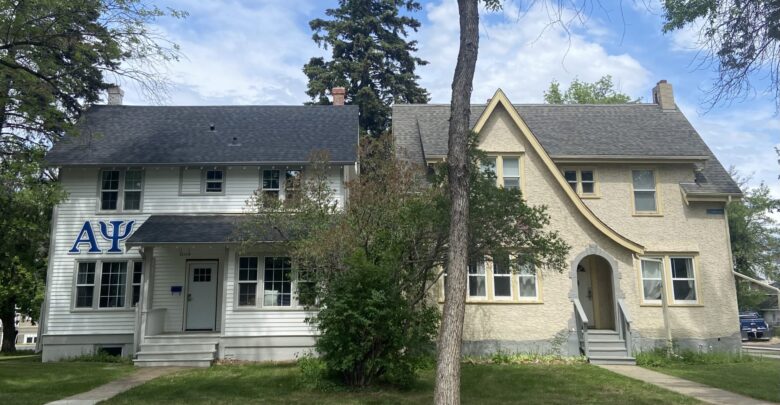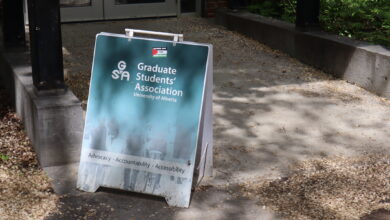U of A to end rental agreements with Greek life organizations
Affected organizations were given a one-year lease extension with their final leases ending in August 2026.
 Kathryn Johnson
Kathryn JohnsonIn April, seven Greek life organizations were notified that their lease agreements with the University of Alberta’s Residence Services will conclude by the end of August 2026.
Affected organizations include Alpha Gamma Delta Fraternity, Alpha Psi Sorority, Delta Chi Fraternity, KORE Women’s Fraternity, Pi Beta Phi Sorority, Pi Kappa Alpha Fraternity, and Zeta Psi Fraternity.
The Gateway spoke to Greek life representatives to understand what this decision means for U of A Greek life.
Thaddeus Ma is the president of the Interfraternity Council (IFC), which is an advocacy group and governing body for its member fraternities. Ma received notice about the decision concerning Greek housing on April 17.
The one-year timeline to find alternative housing has placed affected Greek life organizations “in a really bad situation,” Ma said. “It’s difficult to see houses lose their community space.”
“This decision was just dumped on our lap. There was no consultation with any of the affected housing.”
Quinn Tilling is the Delta Kappa Chapter president of the Alpha Gamma Delta Fraternity. Her fraternity has had its house for upwards of 20 years. Fraternity members were “quite caught off guard by the notice,” she said.
President of Delta Chi Fraternity, Ben Nash, said he feels “puzzled” about the news. He described the decision as “an operational stab.”
According to Ma, an ongoing issue with Greek life is a “lack of communication between the university and the Greek community.”
He said that a Greek liaison position at the university could help to bridge that gap in communication.
“It’s akin to losing a family home,” Tilling says
Ma, Nash, and Tilling all cited the history of U of A fraternity and sorority houses as reasons for their disappointment with the decision. For Tilling, the possibility of her fraternity losing their house is “heartbreaking.”
“It’s akin to losing a family home,” Tilling said. “There’s so much history, and it’s just sad.”
“There’s just so much uncertainty, and everybody feels really uprooted,” Tilling said.
“It’s incredibly difficult to find housing for Greek life that didn’t exist 30 or 40 years ago in the Garneau area,” Nash said. “That’s going to be a real challenge.”
For Ma, although “it’s the people that build the organization,” the houses are integral to fostering community.
“Not only does the house play a big part in building community, it’s also a place where people live. I know a lot of members who move into their houses [and] they expect to live there and continue to live there until their graduation,” Ma said.
“I know some [organizations] have been in their current houses for 10 to 15 years,” Ma said.
Tilling mentioned that these houses offer comfort and security for Greek students who are new to the university area.
“To have a house to be able to go … and to immediately have 40 girls who know me, who love me, who are there for me absolutely changed the trajectory of my university career because I found a comfort in that house that I did not find anywhere else on our campus,” Tilling said.
Maintaining Greek houses is “not sustainable” due to financial pressures, university media relations says
According to Tilling, this decision surrounding Greek housing has brought the presidents of the affected organizations together and shown “just how connected [the Greek] community is.”
“It’s a bit of a silver lining to see that community coming together. It’s just the circumstances under which it’s happening are obviously very stressful and upsetting, but it’s comforting to have a community behind us as we try to figure this out,” she said.
U of A Students’ Union (UASU) Vice-president Logan West has been having conversations with affected Greek life organizations and the university about this transition. According to West, the main reason for this decision given by the university is financial pressures.
“Unfortunately … that financial pressure is now having an impact on our students and the student life experience on our campus,” West said.
“A big concern for us on our end at the SU was just ensuring that we are supporting our student leaders through this transition period as Residence Services moves away from operating Greek life housing.”
The Gateway reached out to U of A media relations for comment, and an emailed statement was provided. The Gateway asked for the reasons behind this decision.
“Maintaining these homes to a standard that meets the needs of today’s students is not sustainable, given increasing costs and inflationary pressures. This decision is aligned with those made for South Campus and rural residential properties,” the statement read.
“The one-year lease extensions are intended to give the groups time to seek new housing arrangements on or off campus. There may be opportunities for accommodations within the university’s residence system. Residence Services will work with the groups if this is the option they choose.”
Entering a new age of U of A Greek life
Housing isn’t the only thing changing for Greek life. According to Ma, IFC is making concerted efforts to make Greek life more inclusive and welcoming.
“There’s a strong stigma [from] what’s been portrayed in the media in the 2000s, what’s seen on the news, and from other campuses,” Ma said. “I know the preconceived notions of we’re just here to party. No, [Greek life is] much more than that.”
According to Tilling, these stereotypes have made Greek life members aware of what needs to change to make Greek culture more inclusive. She said that Alpha Gamma Delta practices inclusive calendar planning to ensure its events don’t fall on holidays their members observe.
“The mandate is how can we support undergrads and our community and how can we make that reach everybody.”
According to data from a recent poll conducted by IFC, of those involved in all 15 recognized Greek organizations, 55.4 per cent are female, 40.2 per cent are male, 3.3 per cent are non-binary, and 1.1 per cent are gender-fluid. Additionally, 28.3 per cent are 2SLGBTQIA+.
Moving forward, Ma said that IFC is wanting to become more involved on campus through supporting organizations like the Campus Food Bank (CFB).
“We are U of A organizations first, and we are here to give back to that community.”
IFC also seeks to work with The Landing to “make sure [their] community is a safe space” for 2SLGBTQIA+ members.
“I think Greek life has taken a lot of important steps forward in moving into a new era of being more inclusive [and] more aware of some of the issues within the community that [have] faced them in the last decade or so,” West said. “I’m really impressed with the work that student leaders have done to bring their organizations into this new era.”
CORRECTION: A correction was issued at 4:57 p.m. on June 16 to reflect that Ben Nash is the president of the Delta Chi Fraternity, not the Pi Kappa Alpha Fraternity. The Gateway regrets this error.




